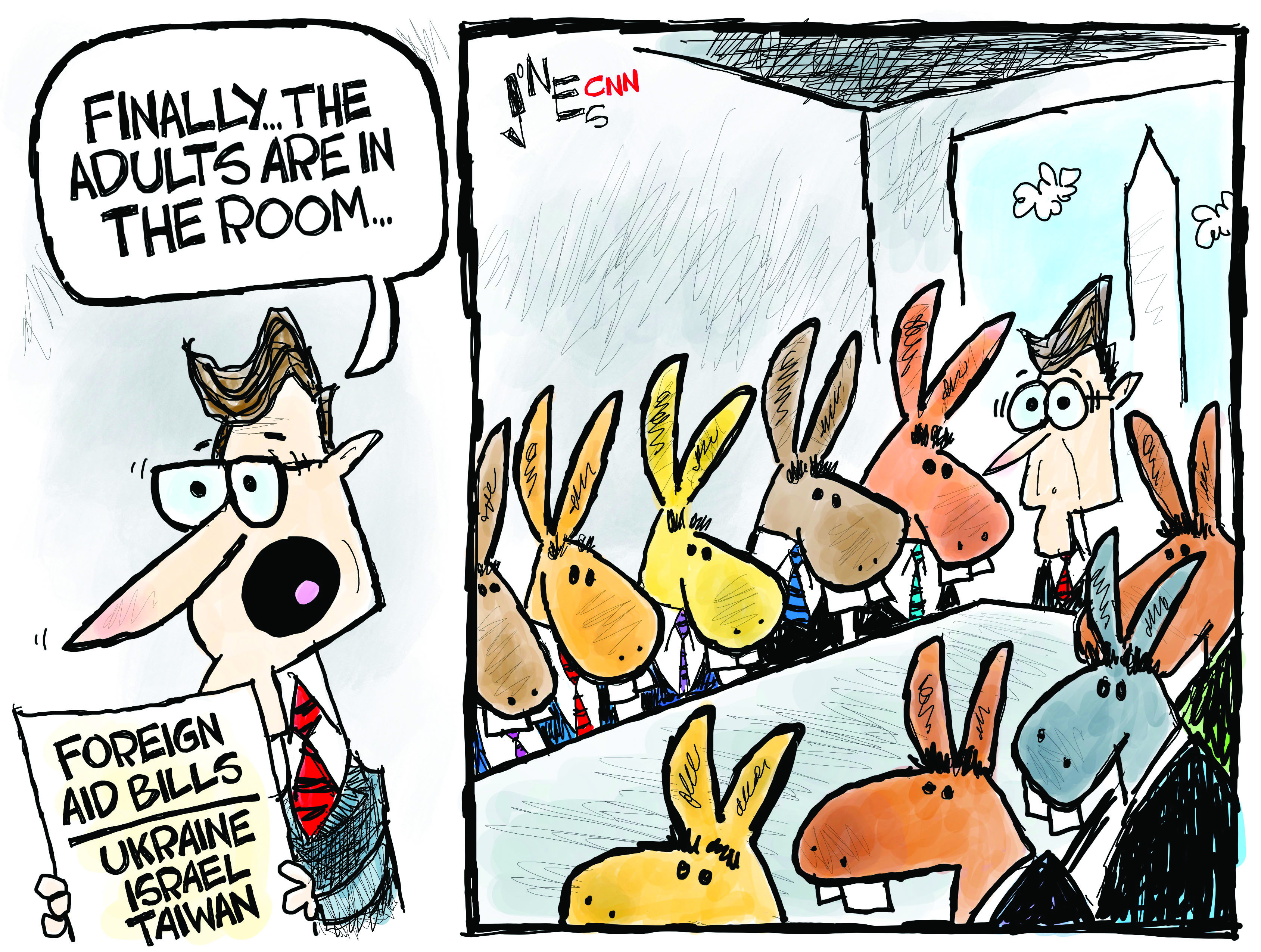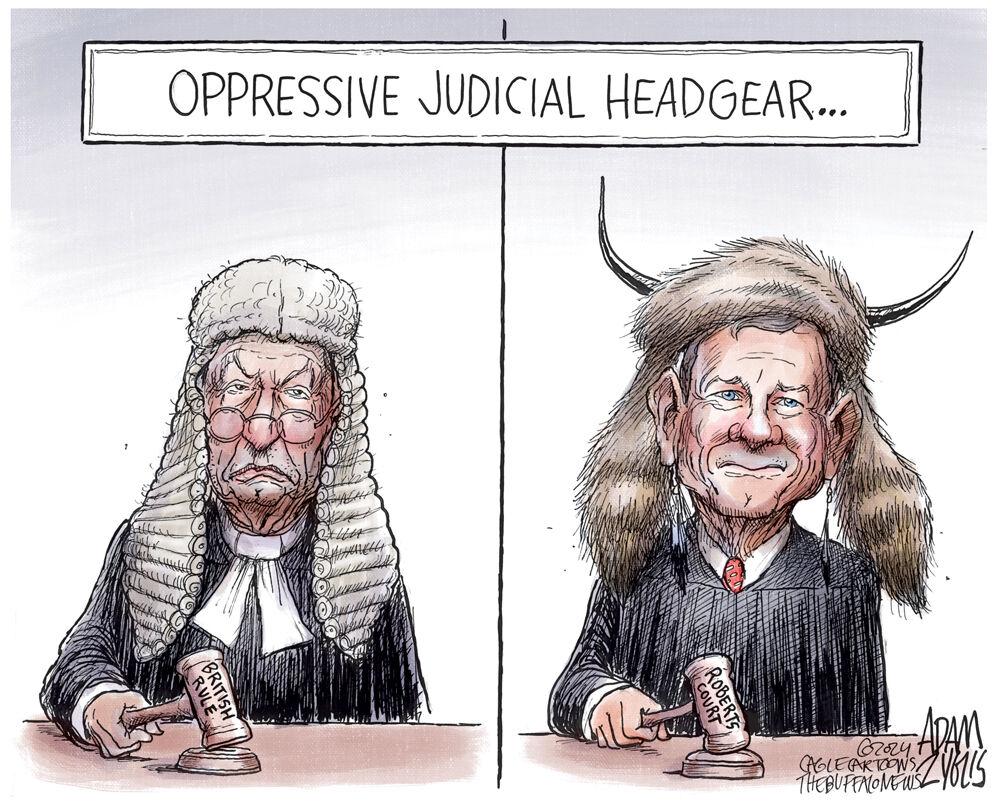Every election is billed as a national turning point. This time that rings true. To supporters, the prospect of Trump 2.0, unconstrained and backed by a disciplined movement of true believers, offers revolutionary promise. To much of the rest of the nation and the world, it represents an alarming risk.
– Eric Cortellessa, “How Far Trump Would Go“
This week’s featured post is “What Trump Would Do“.
On my week off I led a Sunday service at the Unitarian Church of Quincy, Illinois. The topic may be of some interest to Sift readers: “Hope, Denial, and Healthy Relationship with the News“.
This week everybody was talking about Trump’s legal problems

As I reported two weeks ago, the prosecution continues to build a very strong case. The fireworks this week were over the testimony of Stormy Daniels, but it’s important to remember where she fits into the overall case: Trump is accused of falsifying business documents to cover up reimbursing Michael Cohen, who paid $130K for Daniels’ agreeing not to tell her story before the 2016 election.
So the actual truth of Daniels account isn’t relevant. The point is that her story would have damaged Trump politically, motivating him to pay her off and cover up doing so. I’ve heard a commentator describe her as an “exhibit” rather than a “witness”, i.e., the important fact is that her story exists. If it’s true, that’s just a bonus.
A great deal of Trump’s lawyer Susan Necheles’ cross-examination of Daniels attempted to make the jury doubt that her story is true. (Personally, I think Daniels sounds credible, and did a good job fending off the attempted slut-shaming.) But the fact that this story would have been damaging (especially in the weeks between the Access Hollywood tape and the election) seems indisputable. Even if you believe Trump’s claim that Daniels made her story up to extort money from him, you can still find him guilty.
After her testimony, Trump’s lawyers asked for a mistrial, on the grounds that the details of her alleged encounter with Trump were unnecessary and prejudiced the jury against him. Judge Merchan denied the motion, essentially saying that the defense had created the problem itself: It invited a detailed account by claiming in its opening statement that Daniels was lying, and failed to object to the questions that elicited the prejudicial information.
As I observed two weeks ago, the defense still tells no plausible story. The only part of the prosecution’s case that isn’t totally nailed down is that Trump knew about the payment and the reimbursement scheme. (This is the one undocumented part of the prosecution’s account. Like a Mafia boss, Trump is famously reluctant to use email or put anything in writing. Cohen will start testifying today about his instructions from Trump, but there are no corroborating documents or other witnesses.) But Trump is the only one with a motive to set the scheme in motion. Otherwise, you have to believe that Cohen completely on his own borrowed $130K to pay Daniels, that Trump CFO Allen Weisselberg came up with the reimbursement plan without telling his boss, and that the notoriously stingy Trump signed over $400K worth of checks to Cohen with no explanation beyond “legal fees”.
That’s a story, I suppose. But I don’t find it plausible enough to create reasonable doubt.
I wish this trial could be televised, because the transcript makes it look like Daniels won the battle of wits with Necheles. When Necheles characterized Daniels’ porn-directing career as “a lot of experience making phony stories about sex”, Daniels shot back: “If that story was untrue, I would’ve written it to be a lot better.”
After Daniels’ testimony, Trump asked for his gag order to be amended to allow him to respond. That motion was denied for an obvious reason: If Trump wants to respond to Daniels sworn testimony, he can take an oath and testify himself, facing the threat of perjury just like she did.
But that’s not what Trump wants. He wants to smear her in forums where he can lie without consequences.
He’s bound to make a similar request after Michael Cohen testifies, and he’ll get the same result. Trump claims it’s unfair that Daniels and Cohen aren’t gagged, so they can criticize him and he can’t respond. But they aren’t under indictment, and they have no record of inciting violence against people they attack online.

Meanwhile, the most open-and-shut case against Trump, the Mar-a-Lago documents case is indefinitely delayed. Judge Cannon plans a public hearing where Trump will get to air his baseless “malicious prosecution” theory.

ProPublica and the New York Times report on a tax problem that might cost Trump $100 million.
If you’ve ever wandered around downtown Chicago, you’ve undoubtedly seen the 92-story Trump International Hotel and Tower, which sits on the Chicago River proclaiming Trump’s name in giant letters. It looks like a monument to wealth and success.
Actually it’s anything but. The Tower opened into the worst of the Great Recession, and has been a money-loser from Day 1. Losing money, though, isn’t entirely bad, because it produces a tax write-off. The problem is that Trump appears to have written off the loss twice.
and Biden’s increasing rift with Netanyahu

Israel has begun attacking Rafah and is showing intentions to launch a full-scale invasion of the one piece of Gaza where civilians have been taking refuge. Wednesday, Defense Secretary Lloyd Austin told Congress that the administration was “pausing” shipments of certain weapons to Israel.
Austin said that the US is pausing the shipment of “high-payload munitions” due to Israel’s possible operations in Rafah without a plan for the civilians there.
Friday, a State Department report to Congress gave mixed reviews to Israel’s usage of American weapons so far.
The US says it is “reasonable to assess” that the weapons it has provided to Israel have been used in ways that are “inconsistent” with international human rights law, but that there is not enough concrete evidence to link specific US-supplied weapons to violations or warrant cutting the supply of arms.
Netanyahu continues to have no plan for governing Gaza after the killing stops. This is not just a political problem, it has turned into a military problem as Hamas reinfiltrates areas that had already been cleared.
Criticism of Prime Minister Benjamin Netanyahu has increased within the IDF and includes Defense Minister Yoav Gallant who want to know who will replace Hamas. procrastination, they say, has given the terror group space to regroup and force the IDF back into Gaza in larger numbers.
Netanyahu has argued that deciding on a new political manager for Gaza must wait until the war is over, but the IDF and Gallant have countered that during the last few months in which the military have had operational control of nearly all of Gaza avoiding a decision was a missed opportunity.
In my opinion, it is Biden and not Netanyahu who is truly looking out for Israel’s best interests. Netanyahu appears to me to think of Hamas as a leadership structure commanding some number of fighters; capture or kill all those people, and the problem is solved. But I think it’s more accurate to think of Hamas as an idea: Peace with Israel is impossible.
If at the end of this campaign Palestinians are convinced more than ever that peace with Israel is impossible, Hamas will reform — no matter how many of its current members Israel kills.
Meanwhile, the current war erodes the possibility of finding Arab partners to administer Gaza after the war ends. Yesterday, Egypt announced that it would support South Africa’s genocide charges against Israel at the International Court of Justice.
Pro-Palestine voters who are thinking of not supporting Democrats in the fall need to consider what Republicans will do if they get into power. Here, Lindsey Graham defends how Israel is prosecuting the war in Gaza by invoking the US nuclear attacks on Hiroshima and Nagasaki.
That was the right decision. Give Israel the bombs they need to end the war they can’t afford to lose.
When violent counter-protesters broke up the pro-Palestinian encampment at UCLA, the obvious people to suspect were pro-Israel students. But that appears not to be true.
researchers studying hate and anti-government groups have confirmed the presence at the counter-demonstrations of several far-right activists who have been involved in anti-LGBTQ+ and anti-vaccine protests across southern California over the past three years.
This is in line with previous reporting that anti-Muslim and antisemitic online trolls are often the same people. Spreading hate is the point. Any target of opportunity will do.

and the New York Times
I’ve seen a certain amount of debate in opinion columns about whether the NYT slants left or right. The answer, from my view, is complicated, because I think different things are happening at different levels.
You can’t really understand left/right journalistic bias without this observation: Most MAGA positions rely on believing (or at least arguing) things that simply aren’t true: an immigrant crime wave is sweeping through America’s cities, crime in general is up, climate change isn’t real, the Covid vaccine did more harm than good, the economy is terrible, Trump really won the 2020 election (which entails its own full basket of untruths: undocumented immigrants voted, dead people voted, voting machines were rigged …), healthy fetuses get aborted up to (and even past) the moment of birth, Putin’s invasion of Ukraine is justified, the Southern border is “open“, January 6 was a peaceful protest led by patriots, the Black Lives Matter protests burned American cities to the ground, and so on. (I’m sure I missed a few.)
At the reporter level, the NYT remains committed to accuracy, so to that extent it has a liberal bias. On any given day, a MAGA true believer who scans the front page of the Times will almost certainly find something to offend his beliefs about the world.
Similarly, NYT columnists are more likely to lean left than right, and conservative NYT columnists are likely to by anti-Trump. (Of course, yesterday they published a guest essay headlined “Biden is Doing it All Wrong.”) I have little doubt that as the November election approaches, the Times will officially endorse Biden.
But at the level where decisions about what to cover get made, the Times has been showing a decidedly conservative bias. Here’s some data gathered by the CSS Lab at the Annenberg School for Communication.
During the week that [Special Counsel Hur’s] report [on Biden’s retention of classified documents] came out, we examined the top 20 articles on the Times’ landing page every four hours. In that time, they published 26 unique articles about Biden’s age, of which 1 of them explored the possibility that Trump’s age was of equal or more concern. This seems like a lot of articles in a short amount of time, but it’s hard to say whether or not it is excessive without some other equally relevant issue to compare it with. Helpfully, an obvious comparison arose when, on February 10, 2024, Trump announced that if he regained power he would pull the US out of NATO and even encourage Russian invasions of democratic allies if their financial commitments were not to his liking. This announcement that Trump would upend the world’s core military alignment of the last 75+ years, garnered 10 unique articles in the timeframe.
Less quantitatively, I’ve been noticing slanted coverage of Trump/Biden polls. Polls that show Trump leading are highlighted, and sometimes garner multiple articles. Polls that show Biden leading get much less coverage. (Again, the polls themselves are reported accurately; reporters seem to be honest and objective.) Among the polls included in 538’s polling average so far in May, Biden leads in four, Trump in two, and they are tied in one. Would you have guessed that from reading the Times?
In general, if the Right wants the public to pay attention to some issue, that issue will get extensive coverage in the Times. It won’t always be covered in the (false) way the Right wants it covered, but the Times will draw its readers’ attention in that direction.
I have no inside knowledge about the NYT. But from the outside it looks like pro-Trump bias at higher levels competes with commitment to accuracy at lower levels.
and you also might be interested in …

Wednesday, the House voted 359-43 to table Marjorie Taylor Greene’s motion to oust Speaker Mike Johnson. Democrats joined Republicans to avoid yet another protracted leadership battle. It’s not clear what Greene thought she would gain by presenting this motion, which protests all the times in recent months Johnson has allowed bipartisan majorities to pass legislation.
“This is the ‘uni-party’ for the American people watching,” Greene said, as if the two parties working together for common goals constituted some kind of betrayal.
A couple of what-Trump-would-do things that have come in recently: He says he’d deport pro-Palestinian protesters and eliminate protections for transgender students.
Not so long ago, “Will you accept the election results even if your side loses?” wasn’t considered a gotcha question. But today’s MAGA Republicans seem to think it is. Watch Tim Scott squirm around answering it. When the interviewer tries to insist, Scott accuses her of bias: “This is why so many Americans believe that NBC is an extension of the Democrat Party.”
What Scott is indirectly pointing to is the main difference between the parties: Democrats remain committed to democracy even when they lose, but Republicans don’t.
Steve Bannon’s conviction for contempt of Congress was upheld by a federal appeals court. Former US attorney Joyce Vance comments:
Bannon is effectively out of appeals. He can delay a little bit longer, asking for the full court to review the decision en banc & asking SCOTUS to hear his case on cert, but neither one of those things will happen. Bannon is going to prison.
Remember how horrible it was when Biden said “Mexico” instead of “Egypt”? Well, Saturday Trump said “Beijing” when he seems to have meant “Taiwan”. And I have no idea what his tribute to “the late, great Hannibal Lecter” was about.
More serious than replacing one word with another, Trump increasingly utters noises that aren’t words at all, like “carrydoubtitebyrite” and “bordeninriviv“. We all call something by the wrong name occasionally, but I know I’ve never heard my verbal centers glitch like that. Something is wrong.
I was glad to see Brian Broome answer Jerry Seinfeld’s old-man complaint that America has lost its sense of humor due to “the extreme left and PC crap”.
I remember my Mom telling me that nobody was funny any more, not like Bob Hope or Red Skelton or the comedians she remembered. This was during the prime of people like Richard Pryor, Eddie Murphy, and Robin Williams, who I found hilarious.
I remember many of Mom’s favorite comedians. They made fun of drunks and mothers-in-law and so forth. At some point that stopped being funny, because comedy is always changing. If Seinfeld’s routines have stopped being funny, that’s on him, not “the extreme left”.
and let’s close with something colorful
A cloudy evening caused me to miss this weekend’s spectacular display of the northern lights across much of the world. This photo comes from Brunswick, Maine.














